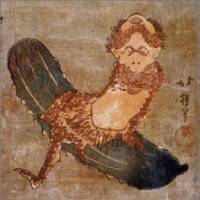Ryunosuke Akutagawa is probably best known outside Japan for "Rashomon" but "Kappa" is considered to be his masterpiece by fans and scholars. Narrated by a "mental patient" and introduced as a tale overheard directly by the author, "Kappa" is a fantastical satire in the "Gulliver's Travels" mold.
Kappa, by Ryunosuke Akutagawa, Translated by Geoffrey Bownas.
141 pages
TUTTLE, Fiction.
Kappa are mythical Japanese creatures, humanoid in form, chameleonic, amphibious and sustained by water held in an indented bowl on the top of their head. Patient 23 is out hiking in Kamikochi, Nagano Prefecture, when he spots a kappa. He gives chase and, rather like Alice pursuing the white rabbit, tumbles down a hole into Kappaland.
Patient 23 is well looked after, makes friends and spends his time learning about their world, only to find himself defending his own culture against the seemingly ridiculous ways of the kappa, thus revealing the flaws Akutagawa saw in modern Japanese society. Religion, morality, legal justice, economics, sex and death are all examined. When the patient eventually returns to the human world, he becomes disgusted by humanity and, like Gulliver, is locked away, his truth-telling being considered "madness."
The satire of this short, playful book doesn't age well, and many of its barbs may be lost on modern readers. The knowledge that not long after finishing this story Akutagawa, fearing madness, killed himself, gives the unnamed Patient 23 a pathos that is lacking in "Gulliver" and "Alice in Wonderland."
Read archived reviews of Japanese classics at jtimes.jp/essential.

















With your current subscription plan you can comment on stories. However, before writing your first comment, please create a display name in the Profile section of your subscriber account page.